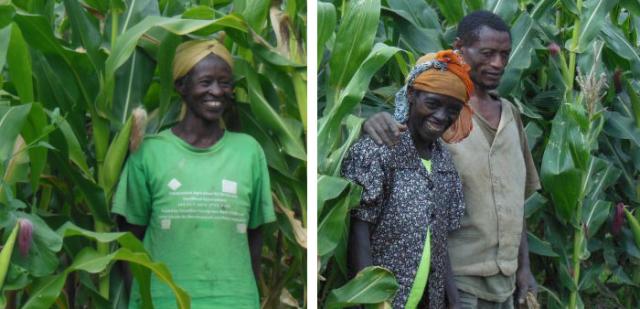Emma Taylor shares the success stories of two women farmers she met during a recent Canadian Foodgrains Bank learning tour to Ethiopia.

I had the amazing opportunity to travel to Ethiopia with the Canadian Foodgrains Bank through The United Church of Canada’s People in Partnership program in August. It was an incredible experience! I want to share the stories of two wonderful women I met. Their example has truly empowered me as a woman to never back down, even if others are telling you that you won’t succeed.
Meet Barari. Barari is a lead farmer in her kebele (village) called Meyche outside of Arba Minch in Ethiopia. She was the first farmer in her kebele to adopt the method of conservation agriculture, which is a method of reduced tilling, intercropping, and mulching to improve the success of crops. You can tell by her amazing smile how proud she is of her farm and the work she is doing.
While we were visiting her, she mentioned that when she first started conservation agriculture the other farmers in her kebele laughed at her, telling her that she was wasting her time and it would never work. She is now in her third season of farming with conservation agriculture, and because of her success, is able to feed her family of six without worry, and sell her extra produce to pay for school supplies for her children. Her pride was evident in the way she presented herself and the fact that she invited us to eat some of her fava beans and share in the work that she has accomplished. I was honoured to have met this woman and share in her pride for her farm.
Meet Alkese. Alkese is another farmer in the same kebele as Barari and in her second season of conservation agriculture. Alkese and her husband Bono are able to provide for their family of eight with their quarter hectare of farmland. Alkese prefers the conservation method over traditional or conventional methods because it doesn’t take as much labour, has fewer input costs, and gives greater yields. By farming this way, they are able to fully provide food for their family, and with the extra money are able to purchase clothing, school supplies, and emergency health care. When Alkese first started conservation farming, all her neighbours questioned her methods and thought she was suffering, but now they are copying her. Her smile says it all.
With training and technical help, supported by Canadian Foodgrains Bank members and Canadian government partnerships, these women farmers, along with many others who have also benefitted from conservation agriculture, are an inspiration to their communities and beyond.
Foodgrains Bank-supported projects through the Scaling-Up Conservation Agriculture in East Africa program are implemented with the financial support of the Government of Canada.
–Emma Taylor lives in Halifax, Nova Scotia. She participated in the Canadian Foodgrains Bank tour of Ethiopia through The United Church of Canada’s People in Partnership program.
Does this blog pique your interest to participate in people-to-people opportunities with global partners? We invite you to find out more at the People in Partnership webpage or by emailing us at pip@united-church.ca. To invite Emma as a speaker contact pip@united-church.ca.